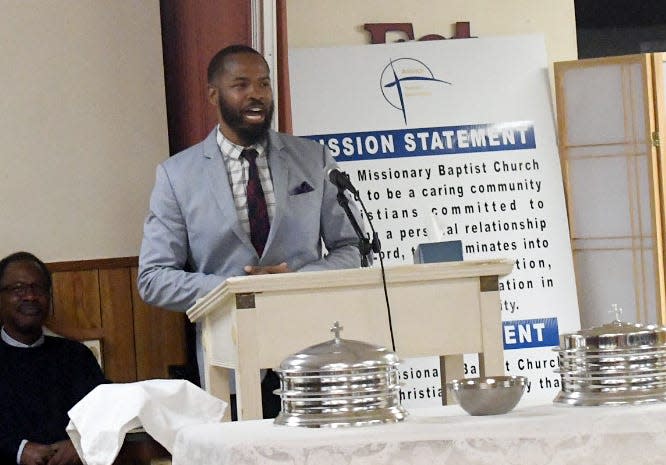Alexandria judge speaks about God, helping others at Black History Month event

Being in a position to help others through God's guidance was the message 9th Judicial District Court Judge David Williams left with his audience at Antioch Missionary Baptist Church’s third Black History Month program.
“He represents Black excellence in our community in comparison to all the negativity you hear occuring in Black and integrated neighborhoods,” said Jeannie Moses Sanders, program coordinator. “It's a breath of fresh air to know there are some Black males with outstanding accomplishments. Williams is the fourth Afro-American to become a 9th Judicial district judge.”
Williams’ father is the Rev. Henry Williams Jr., who pastors Macedonia Missionary Baptist Church. His father is currently preaching a series on the life of the Biblical David, and Williams is doing his own personal studies on the life of David, who reflects on the goodness of God for delivering him from his enemies.
“It is important that we see that God has protected us,” Williams said. “Just like God protected David. Just like God protected our ancestors. Just like God has protected me.”
Black people know what it's like to face trials and tribulations, but they should feel privileged that God chose them, because not everyone can handle it, Williams said. But God chose Black people because He knew that they could.
“We should walk with our chests out,” Williams said. But through those trials and tribulations, they have the protection of God around them.
Williams told a story about some of the things he faced as a youngster when he walked to school at Silver City Elementary School, now W.O. Hall Sixth Grade Academy.
“On the way to school, I can’t tell you the stuff that I’d have to face," he said. "For some reason, when I was a kid growing up in Alexandria, La., I just really didn’t really see the prejudice. But it was there.”
As an adult reflecting back, he now sees the racism and prejudice he endured.
“I was mistreated. I was mishandled,” he said. But he also said that he sees how God surrounded him.
He remembered going as a young lawyer to some courthouses, particularly the one in Clinton, where the CBS show “Dukes of Hazzard” was filmed from 1979 to 1985, and how he was treated differently than his white counterparts.
Though it was 2008, he remembered being the only Black lawyer in the halls. And he said that, unlike his white counterparts, he would get asked for identification. He would be searched. When he walked through the metal detectors, he would have to take his jacket off. He said his white counterparts would watch him as all this happened.
When he would get a favorable outcome for his client, they would get upset with him, he said.
“I remember them following me to the parish line with their deputies, in 2008” he said.
He also spoke about a case he had that involved a 17-year-old who was wrongfully accused of a crime. The case troubled him, and he couldn’t figure out why.
“I heard about a young man, a young Black man, who was wrongfully accused of a crime. He was in jail, a 17-year-old kid, for two years for a crime he didn’t commit because he couldn’t afford to have a lawyer,” Williams said. “He couldn't’ afford to get some of the resources and the access to some of my counterparts.”
Then he went to the jail to meet the young man, thinking he was going to meet a monster.
“And I see a young kid, scared. And at the point I realized, we’re not treated the same,” he said.
It was from that day forward that Williams said he wanted to be the access people need.
When you see people being trampled on, it should trigger something in you, he said.
“Something should click," he said. "It should make you feel something. If you don’t, have a heart check. When God’s people are hurt, when they are being mistreated, when they’re being subjects of prejudice, they’re being subjects of mistreatment, inequality, something in you, in your heart should burn for them. And that’s what God does.
“God used me so I could be that access. People were that access for us, but it took work. They had to get over certain things. Our ancestors, Dr. King, Rosa Parks, Malcolm X... they were sacrifices for us.”
And he said people nowadays have to continue to be that access.
“It’s not easy to be that access," he said. "God listens to you when you have the word in you. When you have the heart of Him. And if you have access to him, there is nothing you can’t access.”
This article originally appeared on Alexandria Town Talk: Alexandria judge speaks about God, helping others at Black History Month event

